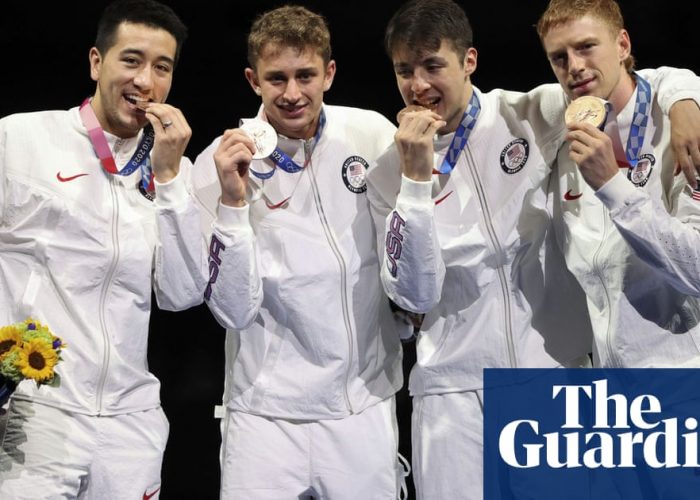Though soccer and rugby teams have taken a knee before matches at the Tokyo Olympics to protest racial injustice, how the authorities would react to a demonstration during a medal ceremony remains to be seen.
Should the American hammer thrower Gwen Berry finish in the top three later this week, it seems likely the question will arise.
The 32-year-old turned away from the US flag while the national anthem played during a medal ceremony at the American trials in June. After qualifying for the final in Tokyo she told reporters on Sunday she will represent the oppressed people if she reaches the podium, adding, Thats been my message for the last three years.
Berry, who is African American, raised a fist during her medal ceremony at the Pan American Games in Peru in 2019. Race Imboden, a US fencer, who is white, knelt on the podium in Lima to draw attention to racism, gun violence and the hate-mongering of the president at the time. Both were warned and given 12 months probation by the US Olympic and Paralympic Committee (USOPC).
The episode led to dialogue with the governing body and the ground has clearly shifted as a growing number of athletes use their social media platforms, their voices and their bodies to advocate for change. The old stick to sports mantra now looks like a relic from a bygone era.
The USOPC announced last December that it will not punish athletes for peaceful protests in support of racial and social justice, while the International Olympic Committee said on the eve of the Games that participants will be allowed to express their views, including on the field of play before the action.
But they still proscribe statements in other situations, such as medal ceremonies, and the limited revision of Rule 50 does not go far enough for many athletes, including Imboden, who decided not to kneel during the victory ceremony for the mens foil team event on Sunday.
Its not my position to cause a stir, he said after the US beat Japan 45-31, to win a bronze medal, to add to Lee Kiefers gold in the womens foil . Not that the 28-year-old Imboden has lost any of his activist zeal.
Imboden was among more than 150 athletes, coaches, advocates and academics, including Berry, Tommie Smith and John Carlos, who signed an open letter last month asking the International Olympic Committee to amend the rule. We believe the global sport community is at a turning point in matters of racial and social justice, and we call on you as leaders in the Olympic and Paralympic movements to make a stronger commitment to human rights, racial/social justice, and social inclusion, the letter read.
Imboden expanded on that theme on Sunday. I think Rule 50 is stopping the voices of athletes and Ive been very open and honest about that situation and Ive written and done work with the social justice council at the USOPC helping change their policies, Imboden said at the fencing venue, a vast convention centre complex in Chiba, about 18 miles east of central Tokyo. I think that athletes should have the right to voice their opinion on the platform that they earn.
Three of the US mens épée team staged a silent, visually-striking, protest last Friday against their teammate. They wore pink masks as a show of support for survivors of sexual assault. The other fencer, in a black face covering, was the alternate, Alen Hadzic. He has been accused of sexual misconduct between 2013 and 2015 by three women. He denies the allegations.
The 29-year-old was temporarily suspended in June by the US Center for SafeSport, an independent athlete safeguarding organisation. The ban was rescinded by an arbitrator, allowing Hadzic to compete in Tokyo, though USA Fencing, the governing body, insisted he stay at a hotel away from the team rather than in the Olympic Village after squad members expressed concerns for their safety and emotional health, as USA Today reported.
Hadzic told the newspaper that he was taken unawares when a teammate handed out the masks before they took the stage ahead of their loss to Japan, giving him the black one.
It wasnt really until I saw that picture from the outside view that I realized what was going on, he said.
Asked if the foil team had considered a similar gesture, Imboden said: We didnt really talk about it. For me its not my place to comment. The épée guys have handled that situation, weve been always supportive of our teammates. We all signed a document to keep him out of the Village and keep our teammates safe. And we listen to the women of our team, honestly, and we support them and we will always support them first.
The Russian Olympic Committee beat the US, 45-41, in the semi-finals, falling to France 45-28 in the gold medal match. It was a good day for one of Imbodens team-mates, Alex Massialas, to leave quarantine. He was forced into isolation two weeks ago after being identified as a close contact of the American beach volleyball player, Taylor Crabb, who tested positive for Covid-19.
Massialas sat behind him on the flight to Tokyo after being given what proved the worst possible perk. I got upgraded to business class, luckily, he said, correcting himself: I guess unluckily. Now he can walk around the Olympic Village and interact with other athletes including his sister, Sabrina, also a fencer with a bronze around his neck.
To come away with a medal after being in quarantine for two weeks? Ah, man, he said. It feels so, so good.read more
Covid isolation, medals and strife: how US fencing became a nexus of controversy


